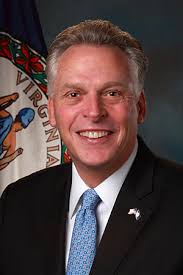Score a “win” for daily fantasy sports, as it was legitimized in Virginia. Gov. Terry McAuliffe (D) applied his signature to the Fantasy Contests Act, which places DFS under the auspices of the state’s Department of Agriculture & Consumer Service,  effective July 1. DFS sites will have to submit to twice-yearly audits and pay a $50,000 operation fee to the state. In a provision echoing one in Massachusetts, employees would be prohibited from playing on rival sites. Unlike many other states, the age of eligibility to play would be set at 18, not 21. There’s some concern, however, that the licensing fee is going to make Virginia the province of big DFS companies like FanDuel and DraftKings. The latter was appropriately grateful for the legislation, issuing a statement that read, in part, “We thank Governor McAuliffe for his leadership and advocacy and are hopeful that other states across the country will follow Virginia’s lead.”
effective July 1. DFS sites will have to submit to twice-yearly audits and pay a $50,000 operation fee to the state. In a provision echoing one in Massachusetts, employees would be prohibited from playing on rival sites. Unlike many other states, the age of eligibility to play would be set at 18, not 21. There’s some concern, however, that the licensing fee is going to make Virginia the province of big DFS companies like FanDuel and DraftKings. The latter was appropriately grateful for the legislation, issuing a statement that read, in part, “We thank Governor McAuliffe for his leadership and advocacy and are hopeful that other states across the country will follow Virginia’s lead.”
Meanwhile, sports book giant William Hill US is clashing with the big DFS operators, saying their contention that DFS isn’t sports betting is “ridiculous.” CEO Joe Asher noted that, unlike sports books, DFS sites can co-mingle bettors’ money with operating funds, and aren’t require to verify their solvency. While he’s not averse to DFS sites pairing with established casinos, he wants to see them go through the Nevada licensing process first.
In other states, a DFS-legalization bill (restricted to professional sporting contests) is  sitting on the desk of Indiana Gov. Mike Pence (R), while state Sen. James Whelan (D) has submitted a pro-DFS bill in New Jersey. It would place DFS under the oversight of the Department of Law & Public Safety and deal casinos into the fantasy-sports action, which would be taxed at the same 9.25% rate as casino gambling. Iowa legislators will reconsider legalization of DFS, while Georgia‘s attorney general has issued an advisory letter deeming fantasy sports betting illegal in the Peachtree State. So, as usual, things are as clear as mud.
sitting on the desk of Indiana Gov. Mike Pence (R), while state Sen. James Whelan (D) has submitted a pro-DFS bill in New Jersey. It would place DFS under the oversight of the Department of Law & Public Safety and deal casinos into the fantasy-sports action, which would be taxed at the same 9.25% rate as casino gambling. Iowa legislators will reconsider legalization of DFS, while Georgia‘s attorney general has issued an advisory letter deeming fantasy sports betting illegal in the Peachtree State. So, as usual, things are as clear as mud.
* According to the American Gaming Association, more Americans (70 million) bet on March Madness than vote for specific candidates in presidential elections. I’m not the least bit surprised. The handle is estimated to be $9.2 billion … most of which, needless to say, goes to illegal and/or offshore sites. Even President Obama has ‘fessed up to wagering on the tournament. According to AGA research, “40 million people fill out brackets; the average person completes nearly two brackets; the average bet per bracket totals $29; and that half of all March Madness viewers have filled out a bracket at least once in their lifetime.” However, this geyser of escaping revenue not only isn’t being capped by Congress, it’s not being domesticated through legalization nor exploited through taxation. The amount legally wagered is a relative pittance: $262 million. It’s the worst of all possible worlds. Speaking of March Madness’ betting ubiquity, AGA CEO Geoff Freeman says, “It’s time for a fresh, rational approach to sports betting that reflects this reality.” We agree.

